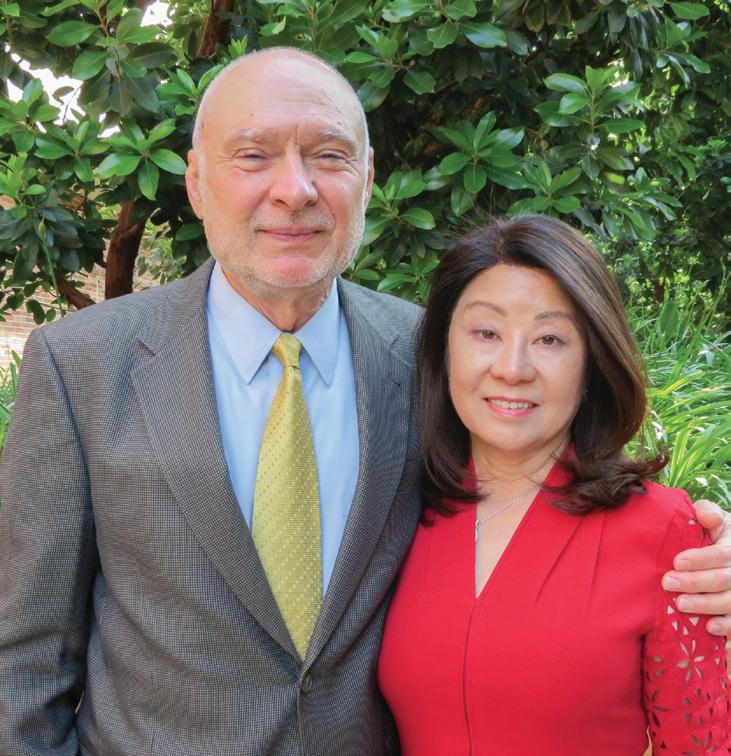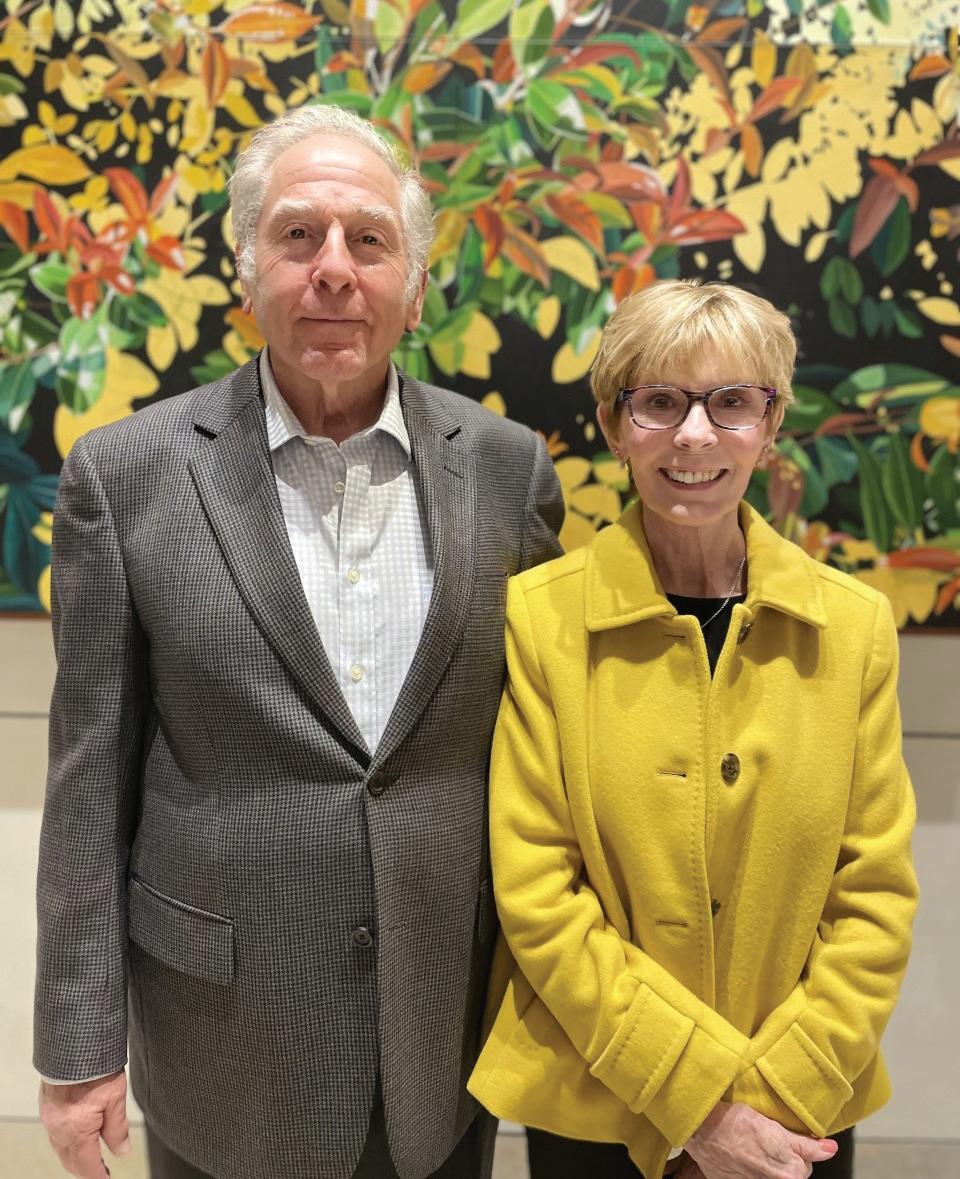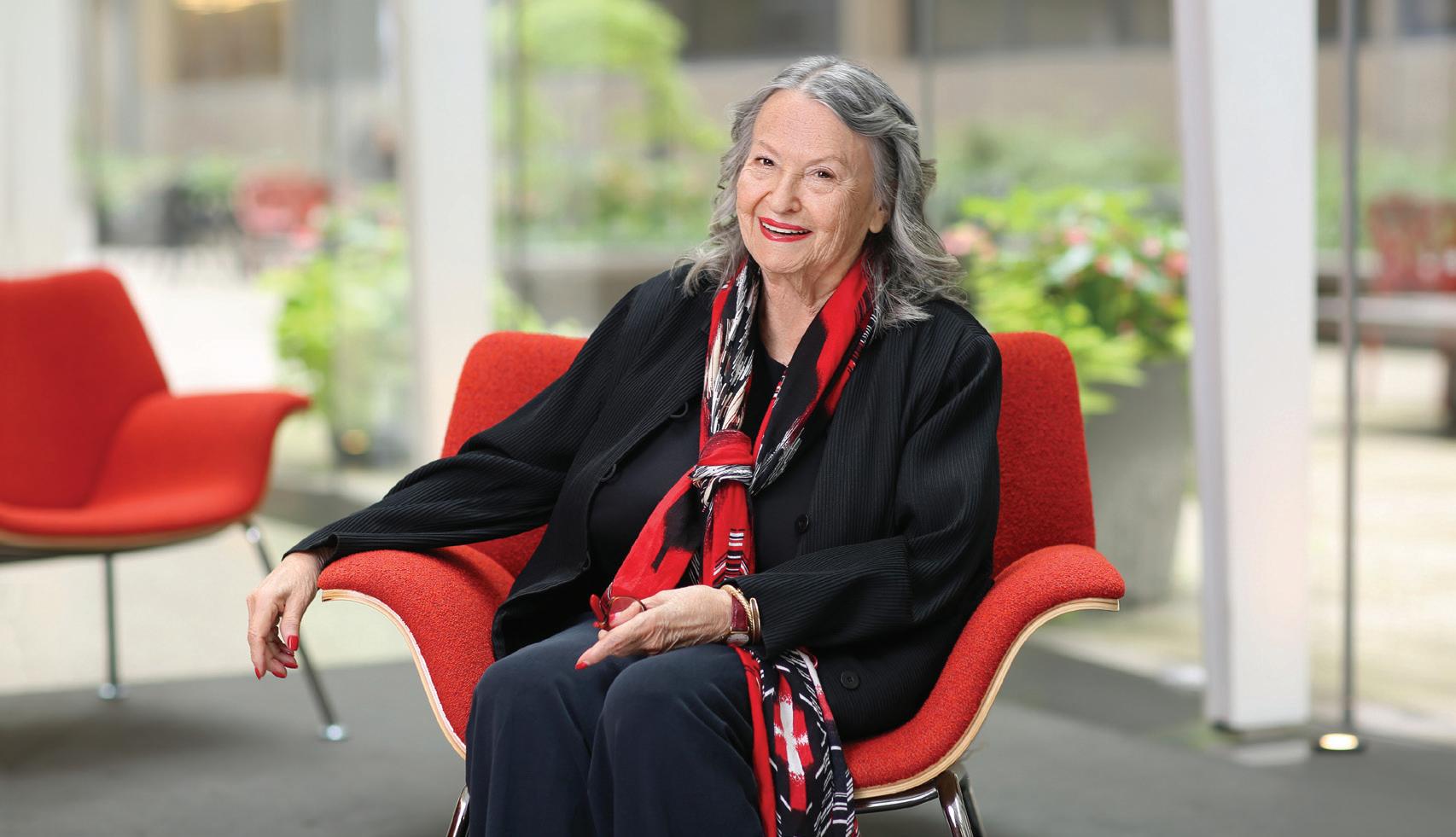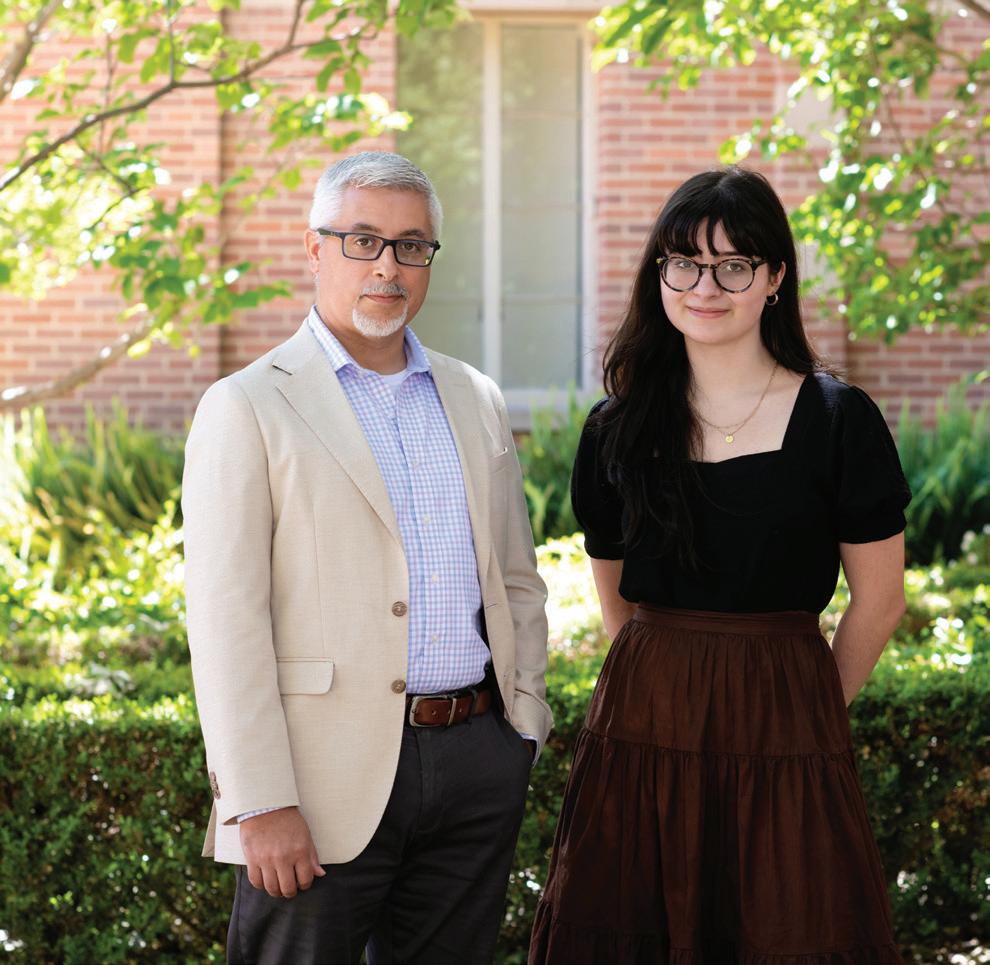
10 minute read
COLLEGE IMPACT
THE RIPPLE EFFECT
WELL-CONSIDERED ESTATE PLANS MAKE IT POSSIBLE TO ESTABLISH DEEPLY PERSONAL AND HIGHLY IMPACTFUL LEGACIES IN THE UCLA COLLEGE
Advertisement
CREATIVE COMPASSION
When alumna Marcia Howard passed away in 2019, no one who knew her was surprised by her final act of generosity to UCLA: a bequest of $2 million.
The gift was split equally between two initiatives. The first, the English department's Author in Residence program, brings eminent writers to campus to teach, introduce students to new perspectives and share their work through lectures and readings. The second is the Laboratory for Environmental Narrative Strategies, or LENS, in the UCLA Institute of the Environment and Sustainability. Through research and collaboration on storytelling, communications and media, LENS faculty and students explore

Robert and Christina Buswell Marcia Howard
how today’s environmental challenges connect to longer histories of imagining the natural world.
A retired insurance broker, Howard considered UCLA her second home—no fewer than 20 campus committees and organizations benefited from her leadership, advocacy and philanthropy during her more than 60 years of engagement.
And in 2014, she gave $1 million to establish the Marcia H. Howard Term Chair in Literary Studies in the English department, currently held by Ursula K. Heise, chair of the English department and interim director of LENS.
“The study of humanities is essential to all aspects of life,” Howard said at the time. “It teaches us to think, reason, write and explore the meaning of what it is to be human.”
A history major, Howard studied in France during her junior year, igniting a lifelong love of travel and European history and literature. After graduating, she worked as an activist in the Deep South during the budding civil rights movement before returning to Los Angeles in 1961. She received the 1998 Alumni Association’s University Service Award.
SPIRITUAL JOURNEYS
Eminent UCLA scholar of Buddhist studies Robert E. Buswell Jr. and his wife, Christina Lee Buswell, fulfilled a longstanding dream when they established the first permanent endowed chair in Korean Buddhist studies outside of Korea.
Through a “blended” gift with a portion paid over five years and the balance as a deferred gift from their estate, the couple committed $3.7 million to the UCLA Department of Asian Languages and Cultures. Their commitments created the Chinul Endowed Chair in Korean Buddhist Studies (pending Academic Senate approval), named for the most influential monk in Korean Buddhist history, as well as the Robert E. and Christina L . Buswell Fellowship in Buddhist Studies.
Robert Buswell, who recently retired from UCLA after 36 years, holds the Irving and Jean Stone Endowed Chair in Humanities at UCLA and is considered the premier Western scholar on Korean Buddhism. He founded UCLA’s Center for Korean Studies in 1993 and Center for Buddhist Studies in 2000, and served as this year’s UCLA Humanities commencement speaker.
“Robert’s impact on the fields of Buddhist studies and Korean studies has been unparalleled,” says David Schaberg, senior dean of the College and dean of humanities. “Not only has he built, here at UCLA, the nation’s largest programs in these two areas, he has also trained dozens of scholars now teaching and studying at academic institutions all over the world. I am immensely grateful for his leadership and for his and Christina’s extraordinary generosity.”
The fellowship gift was augmented by $25,000 by the Humanities Division Centennial Matching Program (made possible by the Kaplan/Panzer Humanities Endowment).
Buswell’s path to UCLA began with a search for life’s meaning that led him to drop out of college in 1972 and serve for seven years as an ordained Buddhist monk in Thailand, Hong Kong and Korea. Drawn to the scholarly study of the Buddhist tradition, he returned to the U.S. and resumed his university education, eventually earning his Ph.D. in Buddhist studies from UC Berkeley in 1985.
Christina Buswell’s embrace of Buddhism also arose from her search for answers: Raised a Catholic in Korea, she immigrated to the U.S. at the age of 13. She earned a B.A. in religious studies from the State University of New York at Stony Brook and an M.A. in Korean studies from Columbia, and went on to become a translator of Korean religious scriptures.
“It was important to both of us that there be at least one U.S. university with a permanent faculty chair specifically devoted to Korean Buddhism,” she says. “UCLA is the ideal place since it has played such an important role in developing Korean and Buddhist studies as fields.”

A BETTER FUTURE FOR ALL
“When you are lucky in life, it feels good to spread the luck around.” This pronouncement by Richard Turco, founding director of the UCLA Institute of the Environment and Sustainability, underpins a recent $1.5-million pledge to the institute from him and his wife, Linda Turco. The couple’s gift commitment was augmented by $750,000 from the UCLA dean of physical sciences’ gift matching program, bringing the total to $2.25 million.
“Thanks in large part to the dedication and pioneering efforts of Richard Turco, the institute has evolved to become a real force for environmental truth and equity,” says current IoES director Marilyn Raphael. “And now we add our deep gratitude for the Turcos’ generosity, which will provide the resources to effectively recruit, retain and empower generations of students eager to become change agents for a sustainable environment.”
The initial gift funds will be contributed over the next five years, with the deferred balance coming from the couple’s estate. When fully funded, the endowment will support an annual lecture, publication awards and fellowships for graduate students, and research awards for undergraduates, with priority given to first-generation students.
“The future of human civilization will best be served by education—at all levels, in all places—and the world’s great universities will be called on to provide an unshakable foundation for global progress, equity and prosperity,” says Turco, a distinguished professor emeritus and former chair of UCLA’s department of atmospheric and oceanic sciences. “Those who have benefited most from past access to education should be among the most willing to support future access for others, with generosity and hope.”
Miguel García-Garibay, dean of physical sciences, lauded the Turcos’ ongoing support: “Not only has Richard been instrumental in building UCLA’s excellence in researching environmental solutions, but he and Linda have chosen to establish a lasting legacy of financial support for this area, helping to ensure the institute’s impact for years to come.”
Richard and Linda Turco
UCLA’s Office of Gift Planning provides flexible, accessible ways to set up an impactful legacy gift. Explore your options: bit.ly/UCLALegacyGiving
UCLA’s department of political science received a major boost when June Jaffee ’54 pledged $1 million to establish a prestigious endowed term chair in her home department.
The June and Alexander Jaffee Chair in Women and Politics, which is pending Academic Senate approval, will support a faculty member and further research and teaching in this vital area.
“Our department is so grateful for June Jaffee’s generosity,” says department chair Michael Chwe. “It is wonderfully resonant that June, a constant advocate for women’s participation in the workplace, is supporting research in our department on crucial questions of women’s participation in politics throughout the world.”
Politics wasn’t on Jaffee’s radar when she started at UCLA in 1949. Seeing medicine as a way to help people, she initially chose pre-med as her major. But after her election as vice president of the Associated Students of UCLA, she changed her major to political science.
“Getting pulled into the internal workings of student activities awakened my interest in politics,” she says.
A year or so after graduation, Jaffee moved from her native Los Angeles to New York, drawn by the excitement and promise of the big city. She met Alexander Jaffee, an accountant, at a party, and they married in 1967. An avid reader, Alex shared his wife’s interest in contemporary issues, and their apartment became a lively salon for UCLA alumni.
Jaffee immersed herself in the hustlebustle of city and corporate life during the 1960s and ’70s, a time of cultural upheaval, emerging feminism and political awakening.
“The world was opening up and changing so fast,” she recalls. “It was a terrific, exciting time.”
Jaffee went on to forge a long and successful career working for several international companies in a variety of public relations roles, including 12 years at Revlon Corporation.
In 2004, she was appointed executive director of a foundation started by Muriel “Mickie” Siebert, the first woman to own a seat on the New York Stock Exchange.
“June and Mickie got along so well because both were female trailblazers who were ahead of their time,” says Jaffee’s cousin, Ann Feder. “They always believed in helping young people— especially women—gain confidence to succeed in their careers.”
It comes as no surprise, then, that this endowed chair marks a lovely full circle moment for Jaffee.
“Women have been the backbone of political campaigns and activism for generations,” Jaffee says. “It is incredibly gratifying to know that my gift will contribute to new research and teaching at UCLA about the vital role of women in politics.”

STEPHANIE YANTZ

A POWERFUL TRIBUTE TO A LEGEND
UNDERGRADUATE SCHOLARSHIPS HONOR ARNOLD SCHEIBEL
The late UCLA neuroscience pioneer Arnold “Arne” Scheibel once wrote, “Above all, to be a teacher is to play a very special life role, whose challenges and rewards are beyond price.”
During an eminent career spanning nearly six decades, Scheibel inspired generations of students and helped shape UCLA’s multidisciplinary neuroscience community while making major breakthroughs in his field. He led the UCLA Brain Research Institute from 1987 to 1995 and launched Project Brainstorm, a K–12 outreach program that continues to this day. Among his many honors, Scheibel earned election to the American Academy of Arts and Sciences as well as UCLA’s highest teaching honor, the Distinguished Teaching Award.
Today, Scheibel’s remarkable legacy lives on in the form of scholarships for UCLA neuroscience undergraduates.
In 2019, two years after his death at 94, trustees of the Scheibel Foundation Trust established the Scheibel Scholarship; they also recently donated a further $480,000, adding to the trust’s previous donations totaling $1 million. The scholarship— awarded so far to 67 outstanding neuroscience majors—provides financial support, hands-on research experience, mentoring by faculty, career workshops and networking opportunities.
Because neuroscience at UCLA is an interdepartmental major, students have vital access to the expertise of more than 200 faculty members spanning nearly 30 academic departments.
“This scholarship is instrumental to train the next generation of neuroscientists,” says Tracy Johnson, dean of life sciences. “This support is making it possible for our diverse and accomplished undergraduates to participate in research leading to groundbreaking discoveries.”
Scheibel Scholar Anastasia Lubarsky (class of 2023) works in the lab of chemistry professor Alexander Spokoyny conducting independent research on the neurological impacts on nearby populations of certain coal-mining techniques used in Appalachia.
“Working in the lab has been a highlight of my time at UCLA so far,” she says. “Thanks to the scholarship, I am able to work on my research part-time while being financially supported. It is my hope that the scholarship continues for years to come to help up-and-coming students like me to conduct influential research.”
Rafael Romero, instructor and academic administrator for the undergraduate neuroscience major, was a first-year graduate student when he took Scheibel’s neuroanatomy class in 2000.
“Arne Scheibel was deeply inspiring, especially to those of us who were considering teaching careers,” Romero recalls. “His ability to weave dry factual knowledge into beautiful narratives helped us all understand and appreciate the nervous system. He effortlessly commanded our full attention every lecture, and we could not wait to hear what he was going to teach us next.”
Romero adds, “The Scheibel Scholars are keeping his legacy alive by actively engaging in research in a well-mentored and supportive environment, and generating new nuggets of knowledge. Arne would be proud indeed!”
Glen Alpert, a neighbor and close friend, became co-trustee of the Scheibel Foundation Trust after Scheibel’s death.
“Arne had by far the most brilliant mind of anyone I’ve ever met. But he was also without ego, simply a wonderful person who loved his students and believed in humanity,” says Alpert, owner of L.A. business management firm Alpert & Associates. “He wanted more than anything to make a difference and move the field of neuroscience forward.”
Rafael Romero and Anastasia Lubarsky








